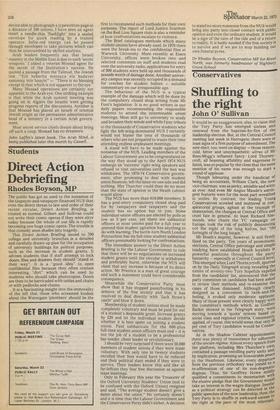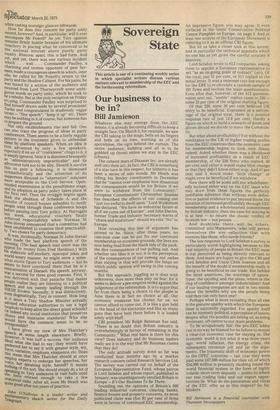Conservatives
Shuffling to the right
John 0' Sullivan
It would be an exaggeration, alas, to claim that the Tory Party has emerged sinless and renewed from the baptism-by-fire of the leadership election. But, at the Central Council meeting last week in Harrogate, there were at least signs of a firm purpose of amendment. The new elect, too, were on display — those remote, cold, bitter and unsympathetic ultras of Mr Rees-Mogg's inflamed fancy. Lord Thorneycroft, all beaming affability and eagerness to listen, was so popular by the close that the mere mention of his name was enough to start a round of applause. Though labouring under the handicap of being an accountant, William Clark, the new vice-chairman, was as perky, amiable and witty as ever. And even Mr Angus Maude's astringent features were for the most part wreathed in smiles. By contrast, the leading Young Conservatives scowled and muttered in conspiratorial groups, aghast at the triumph of monetarism, the changes at Central Office and cruel fate in general. At least Richard Simmonds, who chairs the YC campaign on Europe, took the risk of publicly denouncing not the night of the long knives, but "the fortnight of the long hatpin." Mr Heath's imprint, however, is still firm1Y fixed on the party. Ten years of promotions, elections, Central Office patronage and simple toadying have established Heath loyalists In powerful positions throughout the party hierarchy — especially at Central Council level. This emerged when Lord Thorneycroft, spurred on by the Daily Telegraph scoop revealing the names of seventy-two Tory hopefuls expelled from the candidates' list, announced that the party committee on candidates had been asked to review their methods and re-examine the cases of those dismissed. Although clearly designed as a concession to rank-and-file feeling, it evoked only moderate applause. Many of those present were clearly happy with the committee's methods which, as Godfrey Barker showed in the Telegraph story, were moving towards a 'quota' system based on social class and regional criteria. Consistently applied, of course, this would mean that only 38 per cent of Tory candidates would be Conservatives. As in the Shadow Cabinet appointments, there was plenty of reassurance for adherents of the ancien regime. Almost every speech from the platform, including Mrs Thatcher's own, contained a passage extolling party unity an by implication, promising an honourable peace to the Heathmen. Likewise, every departure from the previous orthodoxy was joined to .a re-affirmation of one of its non-dogm dogmas. Thus, Sir Geoffrey Howe mac% qualified a commitment to monetarism wit . the elusive pledge that the Government would take an interest in the wages dialogue. Insofar as a political strategy can be detected In public speeches of the new leadership, then, tne Tory Party is to shuffle in awkward unison to the right at the pace of the most reluctant,
atic While casting nostalgic glances leftwards. How far does this concern for party unity extend, however? And, in particular, will it ever encompass Mr Powell? As yet Tory opinion remains firmly hostile because of his ultimate treachery in placing what he conceived to be the national interest above purely party loyalty. Rhetoric apart, this is bad form. And Yet, and yet, there was one curious incident Which . . . well . . . Commander Paulley, a charming and tireless opponent of past her esies, made a courageous speech in which, inter Win, he called for Mr Powell's return to the Party and the Shadow Cabinet. For his pains, he was booed by a section of the audience and received from Lord Thorneycroft some ambi guous words on party unity, which he took to be a rebuke. But at the civic reception on Friday ev.:ning, Commander Paulley was surprised to find himself drawn aside by several prominent Tories and congratulated in studiously vague terms "fine speech", "keep it up" etc. There may be nothing in it,of course, but someone has to prepare the ground. Not only establishments rise and fall. One can also trace the progress of ideas at party conferences. There seems to be a fairly regular Pattern in the treatment given to unfamiliar ideas by platform speakers. When an idea is first advanced by only a few speakers, especially if an air of "crankiness" clings to it, it is simply ignored. Next it is dismissed brusquely as "administratively impracticable" and its advocates told not to be silly. Should it survive this to gain a following, it is dismissed
sYMpathetically and the attention of its
supporters directed to "alternative" solutions more acceptable to the Civil Service. Open minded examination is the penultimate stage, and its adoption as party policy takes place in the final reel. Then the struggle begins again. Both the abolition of Schedule A and the transfer of council houses subsidies to needy People went through these conference hoops before passing into Tory policy. At Harrogate last week, educational vouchers finally achieved respectability when Norman St John-Stevas announced that a committee had been established to examine their practicabili
ty. Two cheers for party democracy.
It Was, incidentally, Norman St John-Stevas who made the best platform speech of the meeting. (The best speech tout court was the ,aPPeal for money from Fred Hardman.) With his elaborate self-mockery, episcopal jokes and world-weary manner, he might seem a some
what exotic figure to Tory audiences — but he seems to have convinced them that he is a reincarnation of Disraeli. His speech, anyway, was a success for three good reasons. First, it
was delivered with that panache that makes People realise they are listening to a political speech and not merely leafing through the
ATIESR Review. Secondly, it was distinctively, even dogmatically, Tory in content. How long
is it since a Tory Shadow Minister actually advised education authorities to use a legal Loonhole to keep alive the direct grant schools? t-f,r indeed any social institution that preserves choice and maintains standards? Who else
would have the common sense to be so irresponsible?
I have given my view of Mrs Thatcher's .scieech at some length elsewhere. Briefly, ,however, it was half a success. Her audience
liked what she had to say; they would have preferred her to say it with greater style, wit, ttorce, variation, emphasis, eloquence, etc. Does ehls mean that Mrs Thatcher should at once vrn....P1°Y experts to redesign her speeches, her n,o)u!Fe, her speaking style, herself? It means snIng of the sort. She should simply do a lot of srea`tirig feels to Tory audiences in vast halls until or relaxed enough to take a few atorical risks. After all, even Mr Heath was quite good after ten years of practice.
John 'SuIliv
is a leader writer and r-ap-hmary sketch writer for the Daily Teleg



































 Previous page
Previous page